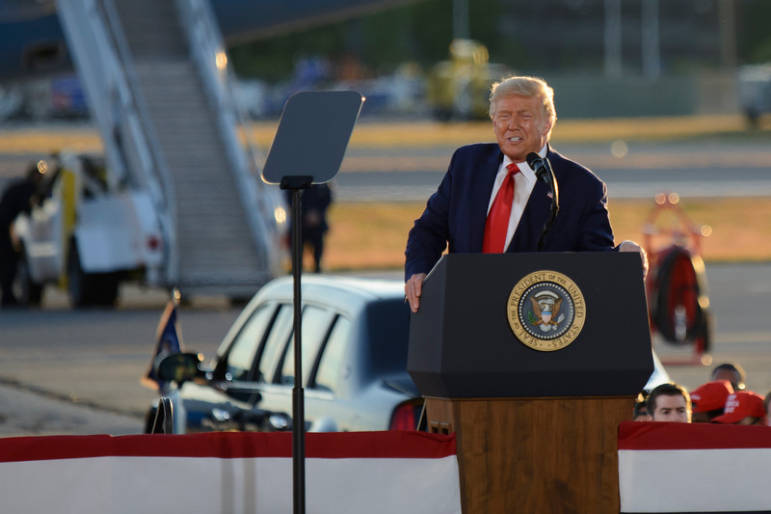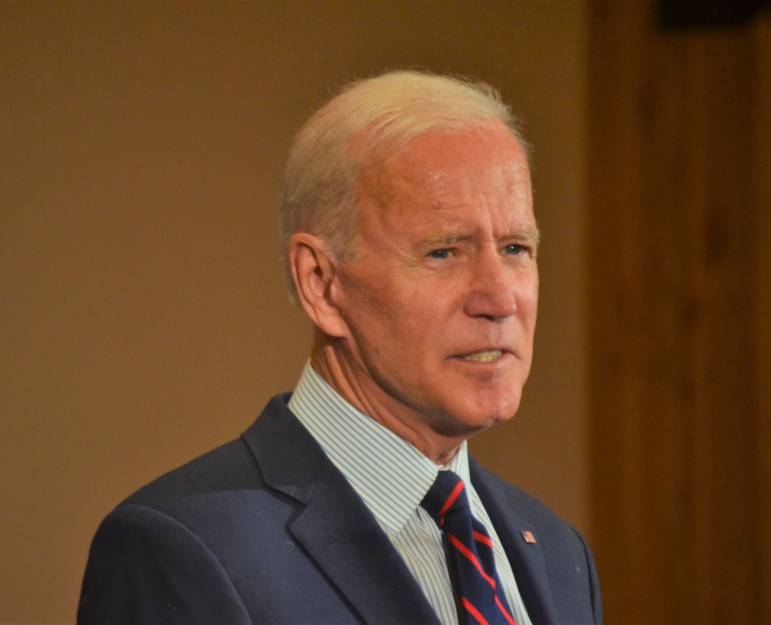On Tuesday, Manchester Ink Link sat down with University of New Hampshire Political Science Professor Dante Scala and got his take on a number of election-related topics. Here’s what he told us.

Q: Recently, you noted the Trump Campaign pulling its ads off WMUR. He’s pulled television ads off the air in several states recently. What’s your take?
A: It certainly suggests that a campaign with a lack of money. That seems to be the shortest explanation for why they are pulling back the way they are. You’d think they’d be trying to spend it in as many places as possible. The other thing to keep in mind is that in New Hampshire the only thing at this point is they might expect a repeat of 2016 where they lost the popular vote, but won the electoral college vote by winning enough Republican-leaning states.
Q: If Trump loses the election, what role will he play over the next four years and what does the future hold for him?
A: Assuming that he’s healthy, I’m not so sure he disappears overnight or the Trumps as a family disappear from the Republican Party. It can be the case that his potential successors have to live in his shadow for some time. I’m not certain that he’ll walk away after being in the spotlight for so long. I’m not saying he’s going to run in 2024, but I think a lot of Republicans would hope for a quick exit so they can turn the page and move on. There are a lot of younger Republican leaders who a lot of Republicans would like to be the face of the party and pretend Trump never happened, but I don’t know if they’ll get that.
Q: Polling in 2016 showed Hillary Clinton ahead for most of the race. Even though Joe Biden’s lead has been steadier than Clinton’s this year, I’ve still heard notes of concern from Democrats that these polls could be a repeat of 2016. What is your take on that?
A: I do think the fundamentals of 2016 were more volatile than they are this time. Four years ago, and I say this as someone who thought Clinton would win, so I was among the majority that were wrong, but four years ago no incumbent on the ballot, both candidates were very unpopular, there were a lot of voters who did not like either candidate but were going to vote and most of those people wanted to try out Donald Trump. There was a fair amount of uncertainty among voters, there were a fair amount of third-party voters or people who said they were going to vote for a third party.
There was a lot of volatility four years ago, whereas this time it’s more of a straight forward decision for people and that’s why we’re seeing more steadiness. When there’s an incumbent in office, the election is first and foremost about the incumbent. As long as the challenger seems like a plausible president, someone who gets over the bar, voters turn to the question of whether or not to fire or rehire the incumbent for hire him four more years.
The choice is simpler, I think it’s really a referendum on the incumbent and trump makes it that way. Even though there have been attempts to make the election about Joe Biden, I don’t think the president cannot make it about him being the center of the universe.
So inevitably, it’s going to be for those voters an up or down decision about Donald Trump. So, can we rule out with 14 days that Trump could win? I can’t rule it out, but I think things are steadier in the polls for a reason. Something very drastic would have to happen for him to come back from where he’s right now. He is in a deep hole. When you look back at history and you have an unpopular incumbent, this is what it looks like.

Q: Joe Biden had a miserable showing in the New Hampshire Primary, and has not returned to the state since. Has his lack of visits to NH going to be a factor for him in November?
A: New Hampshire Republicans tried to make a point of that early on and pointed to his and (Kamala) Harris’ lack of interest in New Hampshire as well. But if you look back at your electoral history here, you can’t really draw a straight line from primary success to general election success.
Ask John McCain, there’s someone who found success in the New Hampshire Republican Primary, but then in the General Election of 2008 against Barack Obama, he was seen as just another generic Republican. These days, voters don’t vote that way, they tend to stick with their party and Primary success just doesn’t translate. So, for Joe Biden going back to the beginning of this year, my instinct is that New Hampshire voters, especially Democrats, didn’t dislike him. He was not a polarizing figure. They weren’t excited about him, but they liked him well enough. I think there was something of a reservoir of good will toward him even if there wasn’t that excitement.
When (Biden) didn’t do well in Iowa, I think a lot of moderates were willing to go shopping for candidates like Buttigieg and Klobuchar. But when Biden became the nominee, there was not an adverse reaction among New Hampshire Democrats to having him at the top of the ticket.
For one, there was so much animus against the current occupant of the White House that when they saw Biden they thought “fine. Not great, but okay.” Bernie Sanders made amends with Biden pretty early, so those folks were okay with Biden. That, plus the fact that independents have broken hard against the president which is the way tend to act toward the party in power unless they are very happy. and for a number of reasons independents are not very happy right now such as the economy and COVID-19.
New Hampshire is acting like it has the last few decades, which is as a state that is a bellwether with slight democratic lean. So, since Biden has a fairly large lead in New Hampshire so far, I am impressed.

Q: On that note, do you believe New Hampshire is still a swing state?
A: Yeah, it’s basically what we saw four years ago. If we go back to 2004 that is when New Hampshire began to get a Democratic lean, but hasn’t been more pronounced over time.
What will be interesting to me is how suburbs of New Hampshire like Merrimack, Londonderry and Bedford react and vote, if places that are typically Republican become a little less Republican or if they even see an eventual Democratic tilt perhaps.
However, I could easily envision a scenario where in two years, Republicans are competitive again, especially if Chris Sununu is still doing well running for governor.
But I don’t know if tick off the state in bellwether status. I think we’re still a long way from becoming Massachusetts or Vermont.
Q: The two parties have different views on COVID-19, and that has reached all the way down to how they campaign, both in terms of messaging and in terms of logistics. What role will that play, if any, in terms of the election’s outcome?
A: Not for headline races. Typically, political scientists tend to agree in saying that campaigning can be overrated. It matters, but both sides do it, so they tend to offset each other. It matters on the margins in close races, but it doesn’t make big differences. When you’re talking about races at the top of the ticket or when you look at races with 10, 12, 15-point differences, I think those things at the margins will be a big deal.
For me, the biggest question about New Hampshire’s results is the state legislative races. To me, that’s where the campaigning differences will play out.
A lot of voters go in to the polls and those State Representative candidates can be anonymous even for regular voters. A lot of time during campaigning and someone is running for state rep and they have a five-minute conversation with the voter, that conversation might stick in the voter’s head. That voter might say “I met Joe Smith, I met Mary Jones, so I will vote for her because she showed an effort,” To me, situations like that is where campaigning has the greatest effect.
Also, if you’re a Republican running for state legislature, what influence will the up-ballot stuff have? Will they be swept out? There’s a lot of mail going out now saying things like “send GOP legislators to help Chris Sununu,” they’re really making that push now because Sununu wants a veto-proof 2/3rds majority.
Q: If campaigning isn’t the biggest thing impacting top-of-the-ticket races, what is the biggest thing?
A: That is a good question. There’s an exclusion for the Governor’s race. Sununu is running his own race and he has capacity to do so because he has name ID, people feel they know him well, and he’s been front and center all year because of COVID.
Beside Sununu, it’s about the President. If you look at the Republicans running for the U.S. Senate and U.S. House, they’re Trump-like candidates. Whatever Trump pulls in New Hampshire, they’ll be within a few points. They probably won’t do any better and they’ll probably do a little bit worse.
Q: One issue brought up by Democrats is the elimination of the Electoral College. If the Electoral College is eliminated, how would that affect New Hampshire?
A: We do tend to see that when New Hampshire is competitive, we tend to bat above our weight in the attention that we get. Without the Electoral College, we might not see as much intensity in a general election.
But in that scenario, there probably would be some advertising up here in a General Presidential Election. We’d get some spillover from Boston and since there’d be more advertising in Massachusetts because there’d be an emphasis in getting out the vote in Democratic areas. Nobody is going to spend money now on the Presidential race in Massachusetts.
There might be a little less attention to New Hampshire, we might not bat above our weight anymore, but right now we’re not getting a lot of attention since the race is pretty lopsided up here.

Q: Does it make sense to have 400 state representatives in New Hampshire? If not, what’s the right number?
A: If you’re not going to pay the legislators a respectable salary and make them at least quasi-professionals, if you’re not going to make it a professional legislature where this can be a full-time job, you might as well keep it as it is. That to me is the real distinction.
The difference is a citizen legislature versus electing a professional legislature where you are paying incumbents for better representation. I don’t know if you get a big improvement in the product even if you reduce it by half. At least now, even with an amateur citizen legislature, at least it’s close to the people because the districts are so small.
If they are double or triple the size of districts but you still don’t pay people, I don’t know what you’re accomplishing other than people being less likely to be heard by their legislator. If you aren’t going to change that, you might as well keep it as it is.
If you are going to pay them, then the number of legislators could be seriously lower, perhaps two-thirds or three-quarters smaller. But only if you are going to pay them.

Q: In 2018, Maine began to used ranked-choice voting, following in the footsteps of countries like Australia and Ireland. Can third party candidates ever overcome Duverger’s Law in the U.S. without some sort of voting method other than first-past-the-post like ranked-choice voting?
A: No, basically it’s rigged against success by third parties. In order to level the playing field, we have to change the way we elect representatives. Lee Drutman makes this case. Only way a green Party, let’s say, gets in would be a representational threshold, for say 10 or 15 percent.
Things would have to change that way to see a multi-party system like we see in other democracies.
Q: Is there a best method of voting?
A: I think regardless of anything, I think a lot of people in two weeks will say that if Trump is out of office that things will get better, but there are some deep-rooted problems regarding polarization.
One of the problems is the winner-take-all mentality our country has.
Everything Joe Biden talks about is regarding lowering the temperature of the nation’s discourse, but we do seem to be stuck in this way where it’s “I win, you lose,” if you’re a conservative you go one way, if you’re a liberal you vote the other way. That needs examination. I don’t think it’s a healthy condition for our politics.
Drutman’s argument is that the incentives are all there. Even if Donald Trump is not president, what is going to change exactly? That needs to be examined.

Q: Could nepotism, either in the Biden family or the Trump family, be an October surprise?
Regarding the Trump family, we’ve seen more than enough stories about possible corruption, if we see one more, I don’t think it will make much difference.
And in regard to recent New York Post article (regarding Hunter Biden), if that’s the best out there, I think it will be a wash.
This year is so different because of the huge events in peoples’ lives. There are so many things in people’s lives right now that it’s hard to distract them. It would really take something huge, not just “oh, Hunter Biden traded off his dad’s name to make money.” I don’t think that’s going to move the needle.
I don’t think that’s necessarily a great way to live your life, but will that make people who strongly disapprove of the President right now move off of Biden and go back to Trump? I find that highly unlikely.
Q: Do you have any predictions for races other than Trump vs. Biden?
A: I think Sununu is sitting comfortable at this point, but I don’t think his coattails will extend to candidates for federal office. As I said earlier, Corky Messner, Mowers, Negron are all in the same boat and that boat is taking on water. They will have real difficulty outrunning the president and right now that looks bad.
If any of them crack 45 percent, they should be proud of that. If they get that close, it would be a pretty significant accomplishment at this point.
With the New Hampshire House and Senate, Republicans would be thrilled to have a majority, but they will be satisfied if they can keep losses in the legislature to a minimum.
A worst-case scenario would see veto-proof majorities in the legislature for Democrats, a scenario where Sununu takes out his veto pen and Democrats say “that’s nice, we’re going to override you.”
Republicans would definitely be content with the status quo and letting the governor keep his veto pen for the next two years. They won’t be thrilled with it, but given how the headliners are expected to do, they’ll live with it and fight another day.







